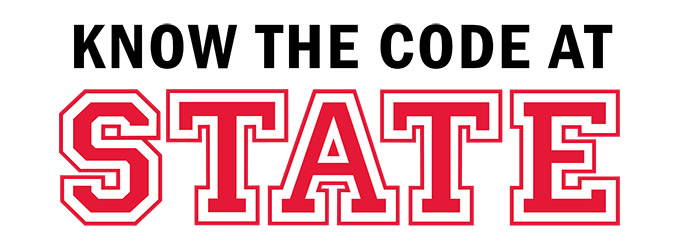Know the Code

Overview
As a student at Illinois State University, you are expected to “Know the Code. The “Code” refers to the Code of Student Conduct, which is the document that details the behavioral expectations (social and academic conduct) of all students at Illinois State University. The Code also describes the educational nature of the conduct process, and the rights and responsibilities of students and other participants in the conduct process. While every section of the Code is important to know, there are a few portions that all students should pay particularly close attention to; there are also operational aspects of the conduct process that are not outlined in the Code. The information found below is adapted from the Code of Student Conduct and operational guides.
Jurisdiction
Illinois State University will investigate any and all possible Code of Student Conduct violations that are brought to the university’s attention. Wherever a student goes, they are a Redbird and represent Illinois State University. This means that if a student violates a policy in Normal, Bloomington, another state, or even another country, Illinois State University has an obligation to investigate the behavior. This includes behavior that occurs during summer and other breaks in the academic year.
Community Membership
Often a student may be charged with violating the Code of Student Conduct if they are involved in a criminal violation. Illinois State University will still hold the student accountable for their actions; by enrolling at Illinois State University the student is agreeing that they are joining the university community and will abide by those community expectations which are found in the Code of Student Conduct.
Criminal Process vs. Student Conduct Process
There are several differences between the criminal process and the student conduct process. First and foremost the student conduct process holds students accountable for violations of the Code of Student Conduct not violations of the law; however often students may violate a law and in turn also break a policy. As mentioned in the section above the educational process is separate from the criminal process and students are held accountable by each community that they belong to.
Finding of “In-Violation”
The Code of Student Conduct defines the burden of proof in the student conduct process as “preponderance of information” which means more likely than not. This is the standard of proof at most colleges and universities in the U.S.
Consequences of violating the Code of Student Conduct
The student conduct process at Illinois State University is an educational one. If a student violates a policy of the Code of Student Conduct they will be sanctioned; while a student may receive multiple sanctions, these sanctions fall into two categories:
Inactive are sanctions that determine a student’s standing at the University i.e. censure, disciplinary probation, restrictive disciplinary probation, suspension, and dismissal.
Active are educational sanctions that promote learning, understanding, and reflection i.e. alcohol and/or drug education program, reflective exercises, conflict management training, restitution, fines, etc.
The educational nature of the student conduct process allows for students to receive sanctions that are the most appropriate response to their needs. There are however recommended minimum sanctions for alcohol and other drug related offenses. These can be found on the Resources Page.
Advisors
A student has the right to have an advisor present at all meetings or hearings in the student conduct process. The advisor’s role is non-participatory, limited only to advising the student, and the advisor may not actively participate in the proceedings, nor serve as a witness.
Conduct consultants
Faculty, staff, and student volunteers who have received basic training in the student conduct process. These volunteers are an optional resource open to any student involved in the student conduct process.
Informal Process and Student Conflict Specialists
The Code of Student Conduct allows for instances that both involve and do not involve policy violations to go through the “Informal Process”; focusing on conflict resolution, the harm resulting from a student’s action(s), and restoring relationships and trust within the university community. This process may also be invoked in lieu of or injunction with active and inactive sanctions. Many of the conflict resolution services detailed in the Code of Student Conduct are facilitated by Student Conflict Specialists.
Student conflict specialists are undergraduate or graduate student staff member assigned by Student Conduct to assist students in a conflict resolution intake process. They shall receive training and supervision from Student Conduct professional staff.
Students are encouraged to contact the Student Conduct Office if questions arise about the conduct process.